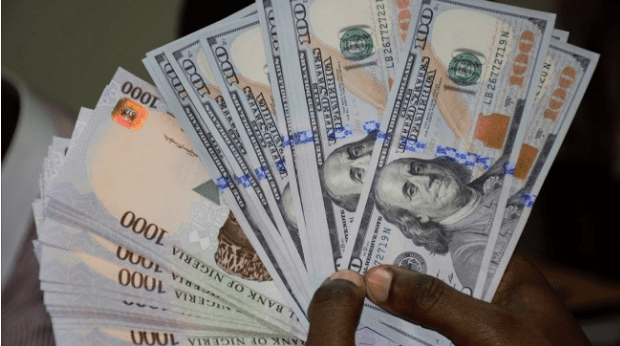The naira plunged further at the official window on Tuesday, closing at an all-time-low of N1,482 against the United States dollar.
The local unit had closed at 1,348 against the greenback on Monday after the FMDQ Security Exchange review the methodology used for the calculation of its rates.
This came as the Central Bank of Nigeria released a circular to authorised dealers on financial market price transparency, warning them against engaging in sharp practices.
The bank stated that its attention had been drawn to the practice of some dealers and their customers in reporting inaccurate and misleading information on transitions in the financial market.
It stated that the behaviour was not compliant with ethical standards… “and deliberate attempts to create price distortions by reporting false transaction details amounts to market manipulation which will not be tolerated and henceforth face sanctions.”
Meanwhile, members of the organised private sector and economists expressed concerns over the development, saying the fall of the local unit at the NAFEX window would likely lead to business shutdowns, job losses, hikes in the prices of commodities and services, and high inflation.
the naira plummeted further on Tuesday, falling to N1482.57/$ as of the end of trading. On Monday, FMDQ Securities Exchange, which calculates the exchange rate of the country, revised the methodology used to set the exchange rate. This some experts believe is a technical devaluation of the national currency.
In a market notice, FMDQ stated, “This revision aims to address recent fluctuations and challenges encountered in the Nigerian Foreign Exchange (‘FX’) Market.”
It noted that the new measures taken would ensure that NAFEX and NAFEM rates accurately reflect market conditions.
It explained, “These revisions are focused on enhancing the accuracy and reliability of the NAFEX and NAFEM rates determination process, with a focus on data availability and integrity involving a rigorous data validation process, including tolerance checks which shall be applied by FMDQ Exchange, subject to internal policies and procedures.”
These moves by FMDQ and CBN were aimed at closing the gap between the official and parallel rates of the foreign exchange market. The NAFEM rate closed at N1348.63/$ on Monday, a lot closer to the parallel rate which closed at N1,450/$.
On Tuesday, the naira closed at N1482.57/$, a 9.93 per cent decline from its Monday rate. On the parallel market, it remained stable at N1,450/$ on Tuesday. On the cryptocurrency peer-to-peer market, the naira was trading for N1,439.5/$ on Binance’s P2P platform as of the time of filing this report.
The naira’s new fall on the official window is set to bear fresh consequences for the average Nigerian, experts have said. The naira continues to tumble despite the best efforts of the apex bank and Federal Government.
Recently, the CBN governor, Olayemi Cardoso stated that the national currency was currently undervalued, and that the bank was working to stabilise the exchange rate.
He said, “In our efforts to stabilise the exchange rate, we must prioritise transparency and create a market environment that creates a fair determination of exchange rates ensuring stability for businesses and individuals alike.”




